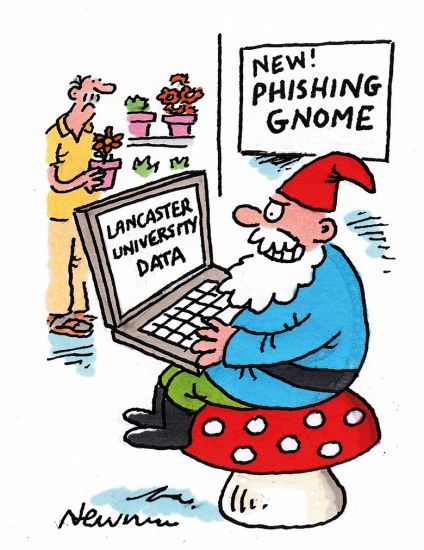
A man has been arrested on suspicion of committing computer misuse and fraud offences after what was described as a “sophisticated and malicious” phishing attack on Lancaster University. The institution said that undergraduate applicant data for 2019 and 2020 entry were accessed, including applicants’ names, addresses, telephone numbers and email addresses. Lancaster said that it was “aware that fraudulent invoices” were being sent to some undergraduate applicants and that it had warned applicants to be on the alert for any suspicious approaches. The university’s student records system was also breached. The National Crime Agency said that a 25-year-old man from Bradford had been arrested.
For years now, the narrative around pay and teaching hours in higher education has focused on increased bureaucracy and restricted budgets, so many were surprised to hear one prominent academic suggest that professors are earning six-figure salaries while rarely putting in an eight-hour day. Writing in The Wall Street Journal, Joseph Epstein, writer and emeritus lecturer in English at Northwestern University, caused controversy when he said that university teachers should be paid by the hour to end the “sweet racket” of being funded to teach only “three or four courses a year”. Unsurprisingly, this did not go down well with his fellow academics. One told Inside Higher Ed the op-ed was “crazy”, while another stated that it “really pissed me off”. One angered academic explained that the main reason “myths about faculty workload persist is that news outlets like The Wall Street Journal perpetuate them”.
Higher education is supposed to open students to the rigours of intellectual debate and respectful argument, but in China, two students let their fists do their talking when they fought over a seat in an air-conditioned library. Both students were trying to get a chair in one of the few air-conditioned study rooms at Qilu University of Technology in Jinan, Shandong province, where temperatures had reached 38°C, according to the Daily Mail. “It has become very popular with the students,” said Yu Mingzi, head librarian of the university. “Everyone was trying to grab a seat.” The student who threw the first punch has been blacklisted from the library because the fight was not his first altercation.
Swansea University has sacked its vice-chancellor, according to a statement published on 26 July. Richard Davies was dismissed alongside Marc Clement, dean of Swansea’s management school and executive chair of the Institute of Life Sciences, for “gross misconduct, with immediate effect”. Both had been suspended in November. The firings are thought to have been linked to concerns over plans to build a £200 million Wellness Village at Llanelli, part of the £1.3 billion Swansea Bay City Deal. A “thorough and independent analysis” by external legal advisers, an independent investigation by an employment law barrister and an examination by an “impartial disciplinary panel” led to the sacking. Professor Davies had previously accused the university registrar of trying to “seize the position of vice-chancellor”, but his grievances have been dismissed. Professor Davies had been due to retire this summer, and Swansea had already announced his successor as Paul Boyle, the former University of Leicester vice-chancellor.
Oregon State University is at loggerheads with local nature lovers after it cut down a tree that was more than 400 years old. The university’s College of Forestry has ordered a temporary halt to any logging of older trees in its research forest after the news of the “mistake” emerged. The Douglas fir in question had survived forest fires and stood since 1599, but was swiftly felled by a university chainsaw, alongside a number of other trees aged 80 to 250 years old in a 16-acre cut that was apparently designed to fund teaching, research and outreach, according to The Oregonian. But the forestry school’s interim dean, Anthony Davis, admitted that the move had been a mistake. “Harvesting this stand did not align with the college’s values,” he said. “Moving forward, we have learned from this matter.”
With Brexit uncertainty, increased visa restrictions and an English-language testing scandal, you would think international students at British universities faced enough hurdles. And yet, according to Universities UK, they – and international staff – are currently facing “unacceptable” difficulties and costs in applying for visas. Students are now “paying through the nose” to get their documents checked via Sopra Steria, a company contracted to check documents and enrol biometric information as part of visa applications. Previously done through the postal service, the job has been outsourced. However, the French IT company is already struggling to cope with the numbers renewing their student visas. Universities say they fear that there will be “chaos” in September when more than 40,000 students are expected to use it.
Register to continue
Why register?
- Registration is free and only takes a moment
- Once registered, you can read 3 articles a month
- Sign up for our newsletter
Subscribe
Or subscribe for unlimited access to:
- Unlimited access to news, views, insights & reviews
- Digital editions
- Digital access to THE’s university and college rankings analysis
Already registered or a current subscriber? Login